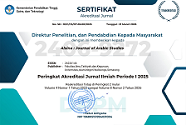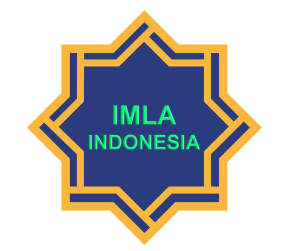Best Practices for Teaching Speaking Skills Based on Management Aspects and ACTFL Proficiency Levels at STIBA Ar Raayah
DOI:
https://doi.org/10.21580/alsina.7.2.28197Keywords:
ACTFL, Arabic Oral Proficiency, Educational Management, Immersive Language Environment, Language Preparatory ProgramAbstract
This study examines the implementation of Arabic speaking instruction (mahārat al-kalām) at STIBA Ar Raayah through the interaction between educational management practices and the application of ACTFL proficiency levels. Adopting a descriptive qualitative design, the research draws on classroom observations, interviews with students and instructors, and document analysis of curriculum materials and ACTFL-related guidelines to capture institutional patterns of curriculum organization, instructional practice, and assessment. The findings indicate that Arabic speaking instruction at STIBA Ar Raayah is institutionally concentrated during the preparatory year (Iʿdād), supported by centralized curriculum management, staged instructional design, and sustained Arabic exposure through residential living and Arabic-medium instruction. ACTFL proficiency levels function as a guiding framework for instructional alignment and formative assessment rather than as rigid benchmarks for outcome measurement. Extracurricular speaking activities operate as complementary spaces for practice and refinement, while the immersive language environment (bī’ah lughawīyah) provides continuous opportunities for language use beyond formal instruction. Overall, the study presents a context-specific best practice model in which curricular alignment, proficiency frameworks, and learning environments interact to support Arabic speaking development. The findings contribute to a deeper understanding of how educational management can sustain proficiency-oriented language instruction within institutional contexts.
Downloads
References
Alfarisi, Salman, and Ari Septiawati. “Suitability of Maharah Kalam Learning Achievement in JSIT Arabic Learning Curriculum With CEFR.” Al-Hikmah: Jurnal Agama Dan Ilmu Pengetahuan 19, no. 2 (2023): 231–55. https://doi.org/10.25299/al-hikmah:jaip.2022.vol19(2).9543.
American Council on the Teaching of Foreign Languages. “ACTFL Proficiency Guidelines,” 2024. https://www.actfl.org/uploads/files/general/Resources-Publications/ACTFL_Proficiency_Guidelines_2024.pdf.
Amrullah, M. Kholis et al. “Elevating Arabic Speaking Skills: Plotagon and Digital Comics as Catalysts for Enhanced Learning Engagement and Proficiency.” Al-Ta’rib : Jurnal Ilmiah Program Studi Pendidikan Bahasa Arab IAIN Palangka Raya 12, no. 1 (2024): 17–32. https://doi.org/10.23971/altarib.v12i1.7564.
Arifin, Zainul et al. “Arabic Language Learning Approach Using Smart Technology in Higher Education.” Izdihar : Journal of Arabic Language Teaching, Linguistics, and Literature 6, no. 1 (2023): 1–12. https://doi.org/10.22219/jiz.v6i1.25011.
Asmara, Linda, and Triono Ali Mustofa. “Strategi Guru Bahasa Arab dalam Meningkatkan Maharotul Kalam di MTs. Husnul Khotimah Kuningan.” Jurnal Onoma: Pendidikan, Bahasa, dan Sastra 10, no. 2 (2024): 1531–41. https://doi.org/10.30605/onoma.v10i2.3557.
Azka, Lulu et al. “The Challenges of Learning Arabic Listening Skills Using Youtube as a Learning Tool.” Alsina : Journal of Arabic Studies 6, no. 2 (2024): 229–46. https://doi.org/10.21580/alsina.6.2.23369.
Bambang Bambang et al. “Planning and Strategies for Maharah Al-Kalam Learning Arabic Language in Madrasah.” WARAQAT : Jurnal Ilmu-Ilmu Keislaman 8, no. 1 (2023): 91–100. https://doi.org/10.51590/waraqat.v8i1.457.
Boyle, Brendan et al. “Overcoming the Challenge of ‘Fuzzy’ Assessment and Feedback.” Education + Training 62, no. 5 (2020): 505–19. https://doi.org/10.1108/ET-08-2019-0183.
Burdah, Ibnu. Melejitkan Bahasa Arab Aktif Melalui Strategi Debat. Malang: CV Lisan Arabi, 2016.
Bush, Tony. “Educational Leadership and Management: Theory, Policy, and Practice.” South African Journal of Education 27, no. 3 (2007): 391–406. https://www.sajournalofeducation.co.za/index.php/saje/article/view/107.
Chan, Paula E. et al. “The Critical Role of Feedback in Formative Instructional Practices.” Intervention in School and Clinic 50, no. 2 (2014): 96–104. https://doi.org/10.1177/1053451214536044.
DeKeyser, Robert, ed. Practice in a Second Language: Perspectives from Applied Linguistics and Cognitive Psychology. New York: Cambridge University Press, 2007.
Gan, Zhengdong. “Understanding L2 Speaking Problems: Implications for ESL Curriculum Development in a Teacher Training Institution in Hong Kong.” Australian Journal of Teacher Education 37, no. 1 (2012): 43–59. https://doi.org/10.14221/ajte.2012v37n1.4.
Haq, Muhammad A’inul. “Pengaruh Permainan Truth or Dare Terhadap Ketrampilan Bicara Bahasa Arab Siswa.” Journal of Education and Religious Studies 1, no. 3 (2021): 102–7. https://doi.org/10.57060/jers.v1i03.48.
Hasibuan, Abdul Aziz et al. “Manajemen Pendidikan Karakter di SMA.” Tarbawi: Jurnal Keilmuan Manajemen Pendidikan 4, no. 2 (2018): 191–212. https://doi.org/10.32678/tarbawi.v4i02.1230.
Hendri, Muspika. “Pembelajaran Keterampilan Berbicara Bahasa Arab Melalui Pendekatan Komunkatif.” POTENSIA: Jurnal Kependidikan Islam 3, no. 2 (2017): 196–210. https://doi.org/10.24014/potensia.v3i2.3929.
Islamiyati, Dian, and Farikh Marzuki Ammar. “Challenges and Solutions in Maharah Kalam Learning: A Qualitative Study in an Islamic Junior High School in Sidoarjo, Indonesia.” Indonesian Journal of Islamic Studies 11, no. 2 (2023). https://doi.org/10.21070/ijis.v11i2.1662.
Kuimova, M.V. et al. “Reading as Extracurricular Activity to Enhance Foreign Language Learning.” PONTE International Scientific Researchs Journal 73, no. 4 (2017): 185–91. https://doi.org/10.21506/j.ponte.2017.4.48.
Liao, Chin-Wen et al. “A Practical Curriculum Design and Learning Effectiveness Evaluation of Competence-Oriented Instruction Strategy Integration: A Case Study of Taiwan Skills-Based Senior High School.” Behavioral Sciences 13, no. 1 (2023): 43. https://doi.org/10.3390/bs13010043.
Liskin-Gasparro, Judith. “Historical Perspectives on the ACTFL Oral Proficiency Interview.” In Challenges and Innovations in Speaking Assessment, 21–39. New York: Routledge, 2024. https://doi.org/10.4324/9781315201504-3.
Mohamed, Salih Yousif Sharaf, and Alimuddin Rivai. “The Design and Implementation of Arabic Speech Proficiency (Kalam) Lectures Is Student-Centered.” ELOQUENCE : Journal of Foreign Language 2, no. 2 (2023): 296–312. https://doi.org/10.58194/eloquence.v2i2.676.
Moon, Jeong-Mi et al. “Streamlining Your School: Understanding the Relationship between Instructional Program Coherence and School Performance.” School Effectiveness and School Improvement 33, no. 2 (2022): 260–79. https://doi.org/10.1080/09243453.2021.2011750.
Musthofa, Ahmad, and Mamluatun Ni’mah. “Pembelajaran Keterampilan Berbicara Dan Langkah-Langkah Penyajian Dialog Di Universitas Zainul Hasan Probolinggo.” Alsina : Journal of Arabic Studies 3, no. 1 (2021): 19–36. https://doi.org/10.21580/alsina.3.1.10881.
Octavia, Nurul et al. “Teachers’ Teaching Strategies for Teaching Speaking Skills at Junior High School.” Borneo Educational Journal (Borju) 5, no. 1 (2023): 37–47. https://doi.org/10.24903/bej.v5i1.1107.
Pan, Steven C. et al. “The Synergistic Benefits of Systematic and Random Interleaving for Second Language Grammar Learning.” Journal of Applied Research in Memory and Cognition 8, no. 4 (2019): 450–62. https://doi.org/10.1016/j.jarmac.2019.07.004.
Poehner, Matthew E. “Sociocultural Considerations of Communicative Competence.” In Communicative Competence in a Second Language, 60–75. New York: Routledge, 2022. https://doi.org/10.4324/9781003160779-5.
Richards, Jack C. Curriculum Development in Language Teaching. 2nd ed. Cambridge: Cambridge University Press, 2017.
Sabri, Hatta et al. “Taʿlīm Al-Istimāʿ Wā-Al-Kalām Bi-Taṭbīq Uslūb Farīq Al-Tadrīs Fī Al-Jāmiʿah Al-Islāmīyah Al-Ḥukūmīyah.” Alsinatuna 8, no. 2 (2023): 241–66. https://doi.org/10.28918/alsinatuna.v8i2.1747.
Saito, Kazuya et al. “How Does Longitudinal Interaction Promote Second Language Speech Learning? Roles of Learner Experience and Proficiency Levels.” Second Language Research 37, no. 4 (2021): 547–71. https://doi.org/10.1177/0267658319884981.
Stockard, Jean. “The Impact of Administrative Decisions on Implementation Fidelity of Direct Instruction and Student Achievement.” Learning Disability Quarterly 43, no. 1 (2020): 18–28. https://doi.org/10.1177/0731948719830346.
Tasseva-Kurktchieva, Mila. “Can Production Precede Comprehension in L2 Acquisition?” Second Language Research 31, no. 4 (2015): 493–522. https://doi.org/10.1177/0267658315581725.
Warner, Chantelle. “Can Frameworks for Language Learning Be Multilingually Indifferent?” The German Quarterly 96, no. 3 (2023): 395–97. https://doi.org/10.1111/gequ.12372.
Wolf, Mikyung Kim et al. “Aligning English Language Proficiency Assessments to Standards: Conceptual and Technical Issues.” TESOL Quarterly 57, no. 2 (2023): 670–85. https://doi.org/10.1002/tesq.3199.
Yoshimura, Yuki, and Brian MacWhinney. “The Effect of Oral Repetition on L2 Speech Fluency: An Experimental Tool and Language Tutor.” In Speech and Language Technology in Education (SLaTE 2007), 25–28. ISCA: ISCA, 2007. https://doi.org/10.21437/SLaTE.2007-5.
Downloads
Published
How to Cite
Issue
Section
License

This work is licensed under a Creative Commons Attribution-NonCommercial-ShareAlike 4.0 International License.
Copyright
The copyright of the received article shall be assigned to the publisher of the journal. The intended copyright includes the right to publish the article in various forms (including reprints). The journal maintains the publishing rights to published articles. Authors are allowed to use their articles for any legal purposes deemed necessary without written permission from the journal, but with an acknowledgment to this journal of initial publication.
Licensing
In order for Alsina: Journal of Arabic Studies to publish and distribute research articles, the editors need publishing rights (transferred from author to publisher). This agreement relates to the transfer/publishing copyright license to Alsina: Journal of Arabic Studies but the authors still have significant rights to use and share their published articles.
Alsina: Journal of Arabic Studies supports the need for writers to share, disseminate and maximize the impact of their research and their rights on any database. As a journal article writer, you have the right to various uses of your articles, including that by the institution or company where you work. Copyright can be used without the need for special permission. Authors who publish articles in the Alsina: Journal of Arabic Studies have broad rights to use their work for teaching and scientific purposes without requesting permission, including:
- Use by the author for lectures, presentations, or conferences, with distribution of copies to participants;
- Distribution to colleagues for research use;
- Use in compilations of the author's subsequent work;
- inclusion in a thesis or dissertation;
- Reuse of sections or excerpts from articles in other works (with full acknowledgment of the final article);
- Preparation of derivative works (other than commercial purposes) (with full acknowledgment of the final article);
- Voluntary posting on open websites operated by authors’ or writers' agencies for scientific purposes
When submitting a manuscript, authors do so on the understanding that if accepted for publication, the copyright for publishing (publishing right) of the article shall be assigned/transferred to Alsina: Journal of Arabic Studies.
Authors whose articles are accepted for publication will receive confirmation via email and sent a Copyright Transfer Agreement.

 Accreditation
Accreditation 
 In Collaboration with
In Collaboration with 

 Visitors
Visitors  Article Template
Article Template





